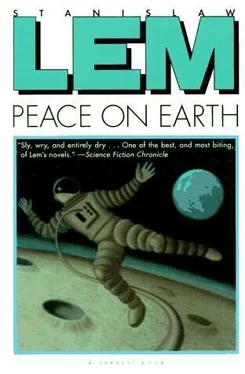The interior was like a cave without a ceiling, which didn’t mean light from above because the lunar sky is as black as night. And the sunlight through the window was not visible as a shaft because there was no air or dust to diffuse it. The sun remained outside, present only as a blazing white patch on the wall opposite the corner where I stood. In its reflection, at my feet, lay three corpses. That’s what I thought in the first moment, because although blackened and distorted they had legs, arms, and one even had a head. Blinking and shielding my eyes from the patch of sun, I knelt over the nearest one. It was not a human body, nor any kind of mortal remains, for what has never been alive cannot die. The form sprawled before me was a manikin but probably not a robot, because its torn-open trunk was completely empty. There were only a few bits of rubble and sand inside. Cautiously I pulled at the thing’s shoulder. It was surprisingly light, as if made of styrofoam, and black as coal, and headless, but then I saw the head by the wall — it was upright on its severed neck and regarded me with its three empty eyesockets. Naturally I wondered: why three and not two? The third eye was a round cavity positioned where on a man you would have the bridge of the nose, but this curious manikin surely never had a nose because on the moon there would have been no point. The other manikins were also only roughly humanoid. Although the destruction of the house had greatly deformed them, you could see that even to begin with they had been only approximations to the human shape. Their legs were too long, about one and a half times the length of the torso, and their arms were too thin and attached not to the shoulders but oddly, one to the chest, the other to the back. Which must have been by design because the explosion, shock wave, and cave-in could have contorted the limbs of one like that but not all of them in the same way. Having an arm in front and an arm in back might be, who knows, advantageous in certain situations.
Squatting opposite the sharp patch of sun and in the darkness with three manikin corpses, I realized that aside from the rapid clicking of the Geiger counter I was hearing nothing — that for at least a few minutes the voice of Wivitch had not reached me. The last time I spoke to him was from the top of the dune that overlooked the ruins, and I had said nothing about my discovery, wanting to make sure first that it wasn’t an illusion. I called Control, but heard only the alarm-rattle of my counter. The radiation level was high, but I didn’t bother to take a reading because as a remote I didn’t have to worry, then suddenly it occurred to me that it was some ionized gas given off by these irradiated broken stones which had cut off my radio communication, and that at any moment resonant absorption could cut my contact with my ship. A stab of fear that I would be stranded here forever, which was stupid because if I lost contact with my ship, only the remote would remain in this rubble and ruins while I found myself back on board. But so far I felt no lessening whatever of control over the remote. My ship must have been hovering right over the house, maintaining the orbit that kept it near the zenith above me. No one of course had foreseen such a discovery or such a situation, but the zenith position is optimal for maneuvering a remote, since the distance between it and its operator is smallest and thus so is the response time. Without an atmosphere the concentration of ionized gas (perhaps from vaporization after the explosion) could not be great. Was it also interfering with communication between the base and the micropes? I didn’t know and wasn’t concerned about that at the moment; what intrigued me was what had happened here and why.
I dragged the biggest corpse, the one with the head, backward through the crack in the wall. Outside, the radio still didn’t work, but I was more interested in this poor thing that had never lived, true, but for all its ghastliness made a most pathetic impression. He must have been nine feet tall, or maybe a little less, was thin, and the head was elongated, it had three eyes, no nose or mouth, a narrow neck, and the hands were prehensile, but I couldn’t count the fingers because the material from which he was made had melted the most there. He was covered with tarry cinders. It must have been hot, I thought, and only then did it occur to me that this could have been a group of buildings like those they once set up on Earth to study the effects of nuclear explosions, it was in Nevada and someplace else too, with houses, courtyards, stores, and streets, but animals were used for people, sheep and goats I think, and especially pigs because like us they don’t have fur and therefore suffer the same kind of burns we do. Had this been such a test site? If I knew the force of the blast that turned these buildings into rubble, I could determine from the present level of radioactivity how long ago that happened, but the physicists could also probably calculate it from the mix of isotopes here, so I put a little gravel into the thigh pocket of my suit, then remembered angrily, again, that I wouldn’t be returning to the ship. But it was necessary to date the explosion, even if only approximately. I decided to leave the contaminated area, reestablish contact with Control, and tell them about this, letting the physicists solve the problem of how to analyze the specimen I’d taken.
I don’t know exactly why, but I picked up the corpse and threw it over my shoulder, it didn’t weigh more than ten or fifteen pounds here, and beat a rather awkward tactical retreat, its long legs dragging on the ground and catching on stones. I had to go very slowly to keep from falling. The slope was not that steep but I wasn’t sure whether it would be better to walk on the slippery glass-rock or over the rubble which rolled and shifted at every step. Because of this difficulty I went in the wrong direction and found myself not on the dune again but about a quarter of a mile to the west of it, between large round rocks that looked like monoliths. I put the corpse down on a flat place and sat to catch my breath before I tried raising Wivitch. I looked for the micropes but the glittering cloud of them was nowhere to be seen. And still I heard no voices though I should have by now. The clatter of the Geiger counter in my helmet slowed until it was like individual grains of sand falling on a drum. Then I heard a muffled voice and went numb, because it wasn’t the base. Incoherent and hoarse, yet I caught two words: “My brother… my brother…” A moment of silence, and again: “My brother…”
“Who is that?” I wanted to shout but didn’t dare. I sat hunched, feeling the sweat break out on my forehead, and the voice again was in my helmet. “Come, my brother. Come to me. Without fear. I do not wish you harm, my brother. Come. We will not fight. Do not fear. I do not wish to fight. Come. Let us be brothers. Let us help each other, my brother.” A snapping sound, and the same voice but in a completely different tone, sharp, barking: “Put down your weapon! Put down your weapon! Or I’ll fire! Don’t try to run! Turn around! Hands up! Both hands! And don’t move! Don’t move!”
Something snapped again and the first voice returned, weak and hesitant: “My brother, come. Let us be brothers. Help me. We will not fight.” It was the corpse talking, that was clear. It lay where I had dropped it, and looked like a stepped-on spider with its abdomen split and its legs tangled and its empty eyesockets staring at the sun. It didn’t move but something inside it was addressing me in a loop. A song in two keys, first come my brother and then the barking. That’s its program, I thought. Whether manikin or robot, it was designed first to lure a man, a soldier, then take him prisoner or kill him. It couldn’t do anything now, all that was left in it was an unburned scrap of the program playing in a loop. But why by radio? If it was built to fight on Earth, surely it would speak in a regular voice. I didn’t understand the radio. There were no live soldiers on the moon, and a robot wouldn’t be taken in by this. Or would it? It just didn’t make sense. I looked at the blackened skull, the twisted hands and melted fingers, the torso ripped open, but now without the instinctive pity of a moment ago. With disgust, rather, with ill will, even though the thing was not to blame, it had been programmed this way. How can one be indignant with a bunch of circuits?
Читать дальше












